Remembering the 2023 Conference
2023 APCDA Conference Video
Attendee Responses to Conference Polls
by Grace Koamesah
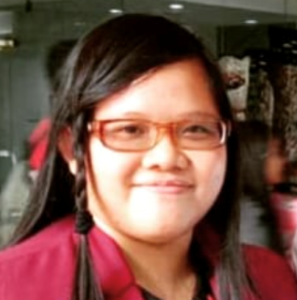 During the conference, some general polls are posted to explore attendees’ opinions on c
During the conference, some general polls are posted to explore attendees’ opinions on c
areer-related matters. We are happy to share the results with you in this article.
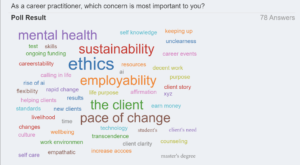 Poll #1: As a career practitioner, which concern is most important to you?
Poll #1: As a career practitioner, which concern is most important to you?
In this Word Cloud poll,we asked which career-related issue matters most. In this type of poll, the words that are frequently typed in will be displayed with a larger font. Based on this graphic, we can see that, for many of our respondents, the most pressing issues are Ethics, Sustainability, Employability, Mental Health, The Client, and Pace of Change.
Ethics is the most popular issue. Ethics could include matters regarding ethical standards and cultural values in career practices. One of the less populate issue, Increasing access for less privileged individuals, could also fall under this heading. Sustainability was also a popular concern. In providing career services, questions like how to ensure ongoing funding and adequate resources to help our clients arise. Many respondents thought employability was an important issue. Some related points might include work environment, decent work, skills, results, earning money, and livelihood.
Mental health is another urgent topic. Related concerns might include well-being, self-care, being empathetic, and reaching affirmation. As we might expect, another significant concern is the clients. Related concerns might include helping clients, facing new clients with their stories and needs, counselling, and client’s clarity. Sometimes one might need to help clients have sufficient self-knowledge, and to know their calling and purpose in life. The rapid pace of change also creates issues, such as career stability, flexibility, the ability to keep up with these changes, unclearness, concerns about Artificial Intelligence (AI) and keeping up with technology.
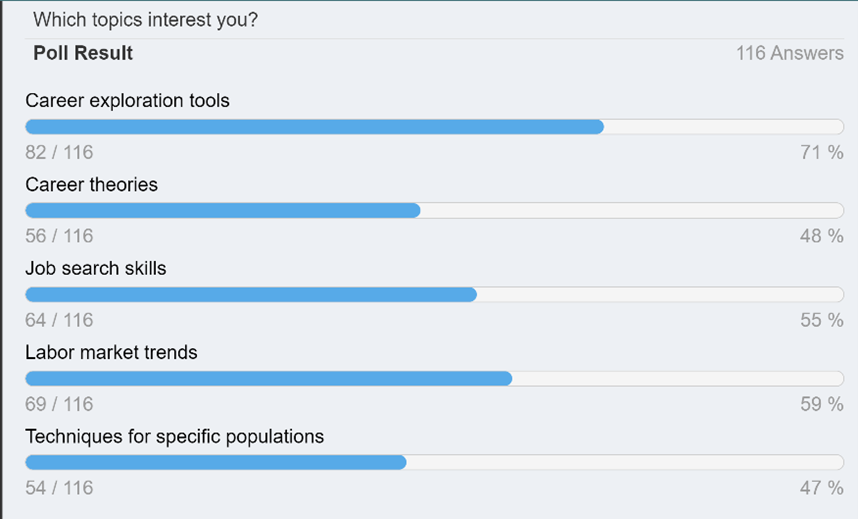 Poll #2: Which topics interest you?
Poll #2: Which topics interest you?
We suggested a small number of topics and asked for a vote to determine which topics are most interesting to our attendees. The majority of people (71%) chose Career Exploration Tools as a topic they wanted to learn more about. A close second choice was Labor Market trends, selected by more than half of the respondents. Job search skills came in third. Career Theories and Techniques for Specific Populations were less popular, but still are intriguing topics for many of our respondents.
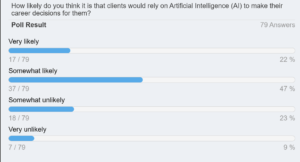 Poll #3: How likely do you think it is that clients would rely on Artificial Intelligence (AI) to make their career decisions for them?
Poll #3: How likely do you think it is that clients would rely on Artificial Intelligence (AI) to make their career decisions for them?
The rise of AI is no longer a surprising phenomenon for us. The questions is, how much influence does AI have on one’s career decisions? According to the poll result, 47% of our respondents thought that it is somewhat likely for people to rely on AI in making their career decisions. Only 9% of respondents thought that was very unlikely. It’s interesting to see that the majority of our respondents (69%) express agreement that clients might rely on AI. This means the majority believe AI will significantly influence career decisions in the future.
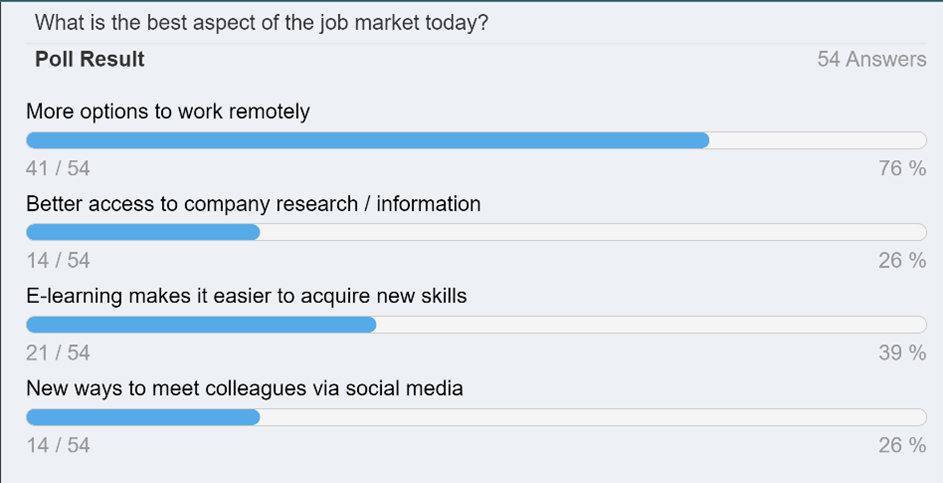 Poll #4: What is the best aspect of the job market today?
Poll #4: What is the best aspect of the job market today?
According to most of our respondents (76%), the best thing that our present job market has to offer is more options to work remotely. It certainly is hard to imagine the past years when remote working wasn’t a choice for most people. We also have respondents who are fond of today’s job market because of better access to company research/information (26%), the existence of E-learning that makes it easier to acquire new skills (39%), and new ways to meet colleagues via social media (26%).
APCDA’s 2023 Virtual Conference
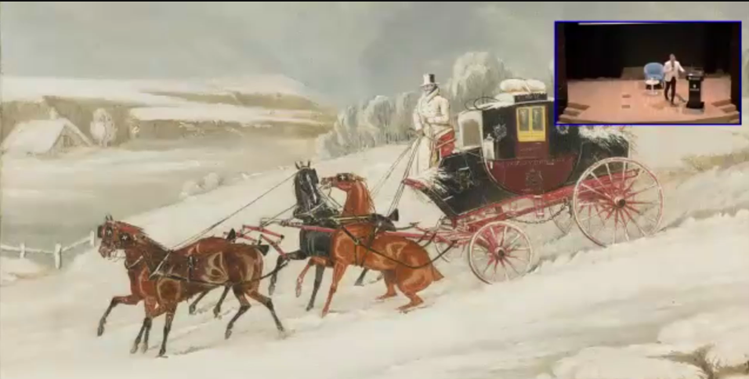 While some people were exploring the exotic sites in Kazakhstan, others participated in the conference virtually. The conference offered over 80 content sessions that ranged from lessons on predicting the future by Dr. Tristram Hooley to a comparison of three generations reacting to the use of Artificial Intelligence in career decision making; and from practical tips for helping adults make career transitions to descriptions of career services in some of our member areas.
While some people were exploring the exotic sites in Kazakhstan, others participated in the conference virtually. The conference offered over 80 content sessions that ranged from lessons on predicting the future by Dr. Tristram Hooley to a comparison of three generations reacting to the use of Artificial Intelligence in career decision making; and from practical tips for helping adults make career transitions to descriptions of career services in some of our member areas.
While some found choosing between so many interesting sessions at the same time slot stressful, all of the content sessions were recorded and the recordings will be available for 3 months. Many attendees have commented on the amazing variety and the value of the content included in this conference.
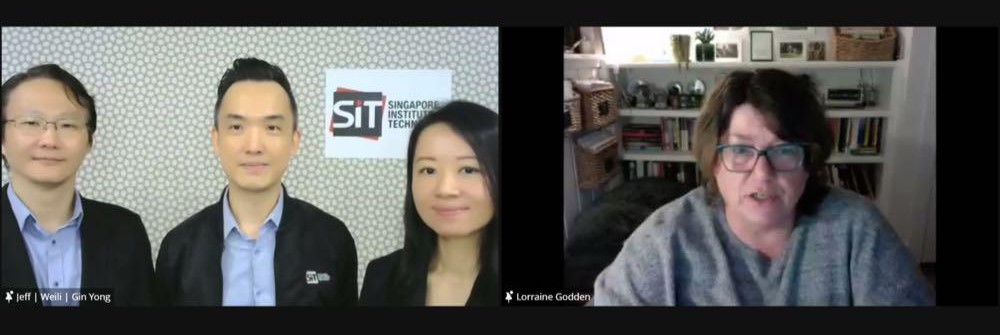 Our new conference website worked well, allowing attendees to find sessions easily and providing opportunities for meetups and sharing of photos. Many of our attendees have told us how much they appreciated this new conference platform.
Our new conference website worked well, allowing attendees to find sessions easily and providing opportunities for meetups and sharing of photos. Many of our attendees have told us how much they appreciated this new conference platform.
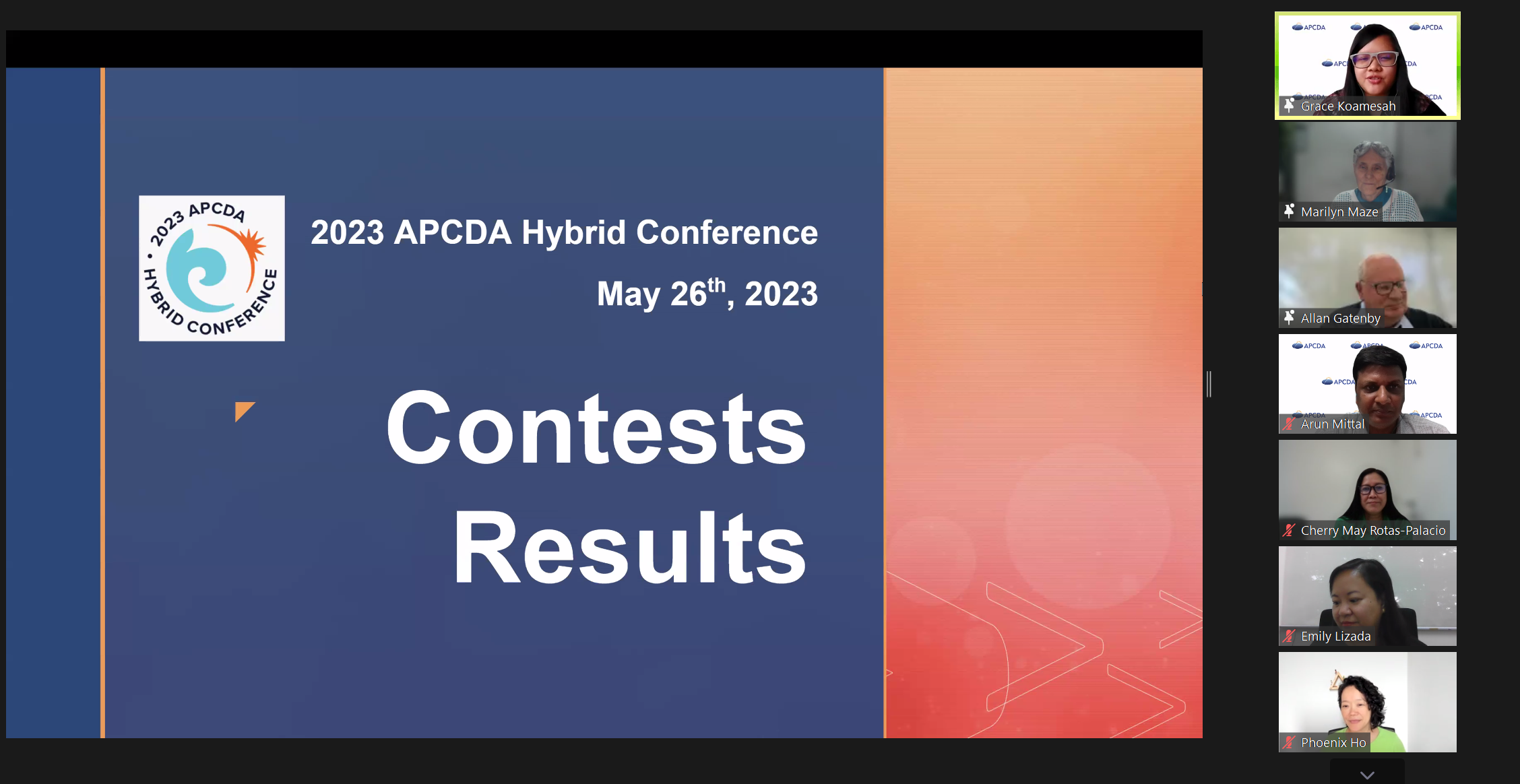
The Leaderboard Contest was won by Mr. Raza Abbas (Pakistan), Ms. Natalie Kauffman (United States), and Mr. Mohit Jain (Nepal). The winners of the Fun Facts contest were Ms. Cherry May Rotas-Palacio (Philippines), Ms. Patricia Favretto-Dicer (Australia), and Ms. Gladys Ramos (Philippines).At the end of the 5th day of the conference, we were happy to look forward to our next conference which will be held in the southern tip of India (in Trivandrum) in April 2024. The structure of the
will be similar, with an in-person option which allows us to encounter a new culture and a virtual option which allows those who cannot travel to enjoy all of the content spread out over a 2-week period.
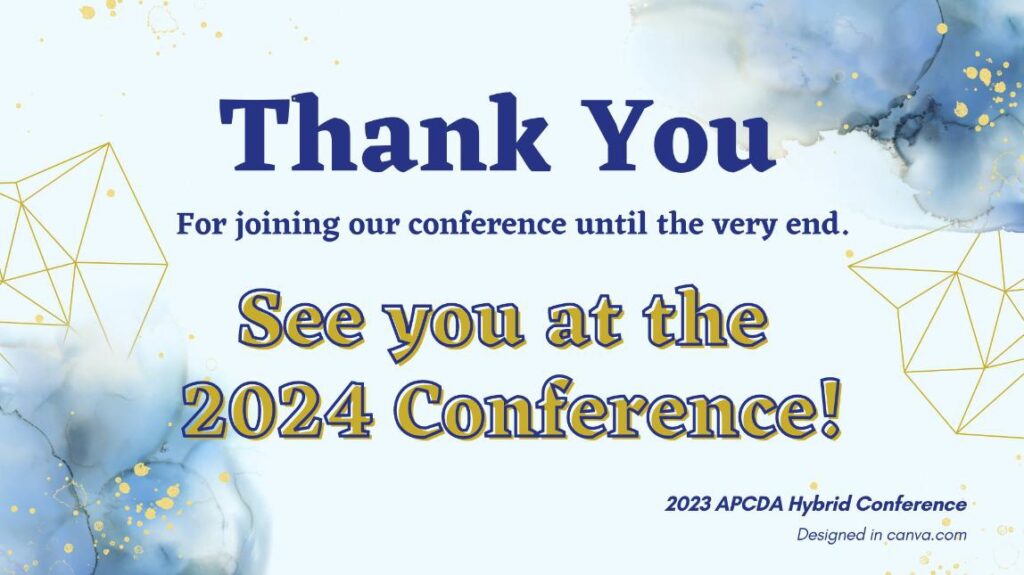
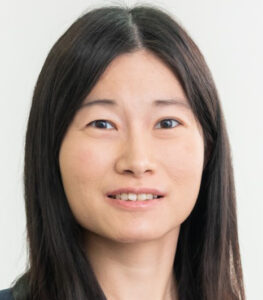
The 2023 APCDA Conference was held locally and virtually under the theme of “New Look at Careers in a Rapidly Changing World.” I‘m pleased to report on the conference, which was taken place on May 16-19 in Astana, Kazakhstan.
It was the first time in the four years since 2019 that the conference was held locally; about 80 participants from 10 countries gathered in Kazakhstan. Personally, this was my first visit in Kazakhstan. When I greeted the first morning after my arrival, I was amazed at how wide the sky was, so wide that I could see the horizon. It was also refreshing to see that it was still bright even after 9:00 p.m. and that daylight was very long. I realized that Astana is located at a high latitude of about 50 degrees north (the same position as the U.S.-Canada border, London, Paris, Kieu, Sakhalin, Newfoundland, etc.). I was also surprised to learn that Astana has a continental climate, with a large daily temperature range (the temperature rises to nearly 25°C during the day and drops to 3-4°C at night, requiring appropriate clothing).
At Nazarbayev University
The venue for this year’s conference was Nazarbayev University, founded in 2010, which started the opening ceremony on May 17 with a speech by its president, Mr. Shigeo Katsu. He made us think about the story of how unfortunate events in neighboring countries have led people who want to receive advanced education to come to Kazakhstan.
The first keynote speaker, introduced by Shigeo Katsu, was Mr. Sayasat Nurbek, Minister of Science and Higher Education of Kazakhstan. The theme was “Kazakhstan and Future Trends,” and we are grateful to him for taking time out of his very busy schedule to speak for APCDA, even though it was limited to about 20 minutes. After Mr. Nurbek, we had the pleasure of having Dr. Loretta O’ Donnell, Vice Provost of Nazarbayev University, spoke at the opening ceremony, which was a very productive event.
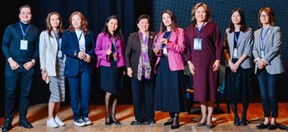 This was followed by the Awards Ceremony. This year, we were able to honor the 14 national scholars and the 6 award recipients both in-person and virtually. In particular, we would like to thank Liliya, Gaiya, and the rest of the Kazakhstan team for their hard work over the past 2 years in preparing for the conference in Kazakhstan.
This was followed by the Awards Ceremony. This year, we were able to honor the 14 national scholars and the 6 award recipients both in-person and virtually. In particular, we would like to thank Liliya, Gaiya, and the rest of the Kazakhstan team for their hard work over the past 2 years in preparing for the conference in Kazakhstan.
The first day of the conference ended with a keynote speech by Dr. Tristram Hooley and a panel discussion on AI and career development by three panelists.
May 18 (2nd day) opened with a keynote speech by Ms. Marie Zimenoff from the United States, “Working in 2035”. I felt that this was very much in line with the theme of the conference and is something that we as career counselors will not be able to avoid in the future.
After the keynote speech, a panel discussion on “Future Trends and the Workplace” was held by 4 panelists, two of whom spoke from Nazarbayev University and two of whom participated remotely, sharing the current situation in their respective countries, and answering questions. It was a very interesting discussion.
Bus Tour
One of the best parts of holding the conference locally is the opportunity to experience the cultural and historical background through sightseeing in the vicinity of the host country. Here is an overview of the sightseeing tour around Astana, the host city of this year’s event.
Sightseeing in Astana City
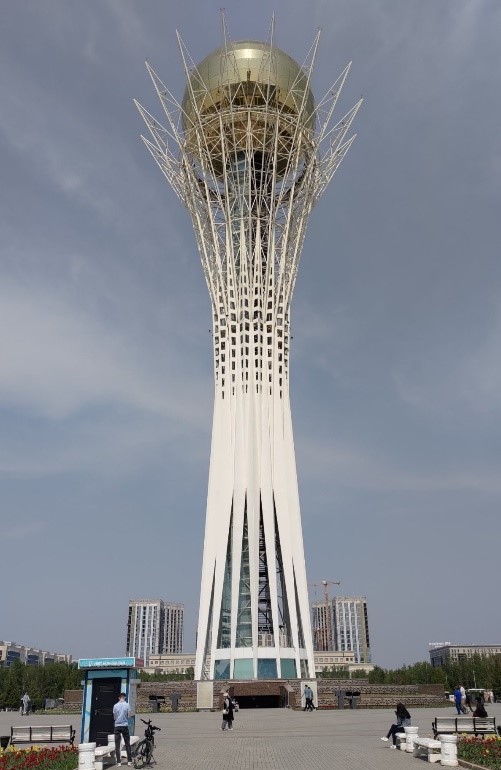 I learned that there are indeed many cultural buildings in Astana. For example, the Bayterek Tower, which symbolizes the Tree of Life. It was built as a symbol of Astana and is featured on Kazakhstan’s banknotes. The 97-meter stone monument is topped by a golden sphere 22 meters in diameter. Blessed with good weather, we were able to enjoy a spectacular view of Astana from the observatory. At the top of the observatory (97 meters high, named after the year 1997 when the capital was relocated), there is an ornament of the handprint of the first president Nazarbayev, and we took a commemorative photo while touching the handprint. Adjacent to the Bayterek Monument, we also visited the pyramid-shaped Palace of Peace and Reconciliation, a cultural center.
I learned that there are indeed many cultural buildings in Astana. For example, the Bayterek Tower, which symbolizes the Tree of Life. It was built as a symbol of Astana and is featured on Kazakhstan’s banknotes. The 97-meter stone monument is topped by a golden sphere 22 meters in diameter. Blessed with good weather, we were able to enjoy a spectacular view of Astana from the observatory. At the top of the observatory (97 meters high, named after the year 1997 when the capital was relocated), there is an ornament of the handprint of the first president Nazarbayev, and we took a commemorative photo while touching the handprint. Adjacent to the Bayterek Monument, we also visited the pyramid-shaped Palace of Peace and Reconciliation, a cultural center.
Incidentally, the late Kisho Kurokawa, one of Japan’s leading architects, was responsible for the urban design of Astana, the current capital of Kazakhstan. As a fellow Japanese, I was somewhat pleased. Mr. Kurokawa is a well-known master who has worked on a wide range of projects, including the Van Gogh Museum and the Kuala Lumpur International Airport. The urban planning of Astana is scheduled to continue until 2030, and I have been very interested to see how the city will look like by then.
Visiting ALZHIR Museum and Grand Mosque
About 30 km west of Astana, we visited the ALZHIR Museum, which is located on the site of the largest women’s camp in the Soviet era. It is also called a memorial to the victims of political repression, and in the 1930s, nearly 8,000 women lost their lives there. Visitors enter the museum by descending through a 12-meter-long tunnel whose walls are decorated with fragments of the history of the purges. Many historical materials related to the ethnic purges in Kazakhstan are on display. The Fierce Cold of ALZHIR, a 20-minute documentary film, features interviews with inmates and their families. A letter of encouragement from a child to his imprisoned mother is heart-wrenching. The museum conveys a wide range of emotions, including the despair and hope of the women who lived during the period of Stalin’s purges. The presence of these museums made me feel the effort to remember the sad history of the city while building a new city.
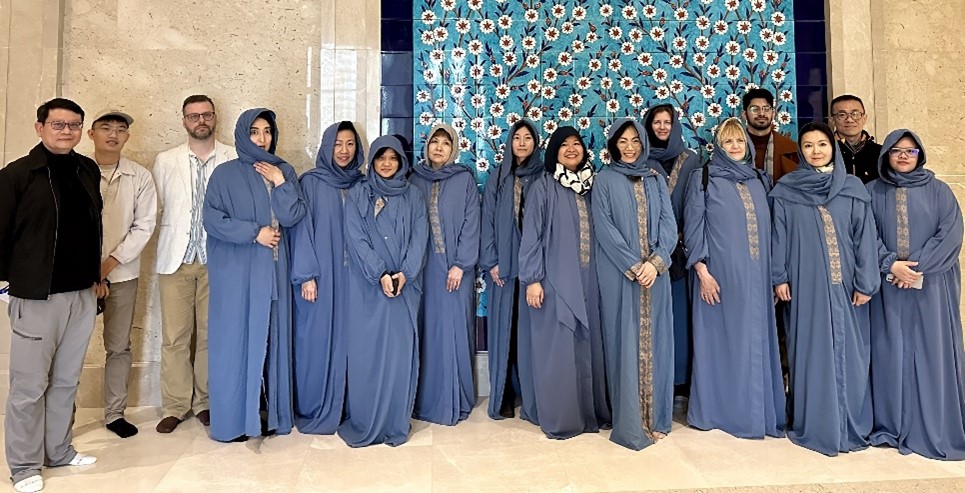 After returning to Astana city, we visited the Grand Mosque, the largest mosque in Asia, which was just completed in August 2022. Upon entering the mosque, women are required to cover their hair and bare skin by wearing a scarf or other covering (there were gowns next to the shoe rack, so we used them). Since shoes are not allowed in the mosque, we climbed on the carpet with bare feet. The ceiling was decorated with beautiful geometric patterns. Kazakhstan has a variety of religions, but 70% of the population is Muslim (so there are no statues of saints). I was impressed by the beautiful contrast between the chalk-white mosque and the clear blue sky, not to mention the inside of the mosque, so much so that all the participants were absorbed in taking pictures.
After returning to Astana city, we visited the Grand Mosque, the largest mosque in Asia, which was just completed in August 2022. Upon entering the mosque, women are required to cover their hair and bare skin by wearing a scarf or other covering (there were gowns next to the shoe rack, so we used them). Since shoes are not allowed in the mosque, we climbed on the carpet with bare feet. The ceiling was decorated with beautiful geometric patterns. Kazakhstan has a variety of religions, but 70% of the population is Muslim (so there are no statues of saints). I was impressed by the beautiful contrast between the chalk-white mosque and the clear blue sky, not to mention the inside of the mosque, so much so that all the participants were absorbed in taking pictures.
Summary
Once again, as APCDA President, I am relieved that we were able to successfully complete our first conference both in-person and online. I would like to express my sincere gratitude to everyone who cooperated and participated in the conference. Personally, as a Japanese, I am happy to have had the opportunity to host the conference at Nazarbayev University, which was created by a Japanese president and attracts many excellent staff and students. I had a chance to meet with President Katsu individually before the conference started, and he gave me encouragement for APCDA’s activities. I hope to continue to make efforts to make our activities a larger circle.
Our next conference in 2024 will be held in Trivandrum, India, April 15-27. The 2020 conference was held online due to the pandemic, although we actually scheduled to be held in India. After a lapse of 4 years, we are happy to be able to hold our conference in India. I look forward to meeting many of our members there.
2023 APCDA Conference Leads the Way to New Perspectives on Emerging Central Asian Workforce Cultures
By Dr. Elisabeth Montgomery
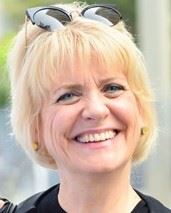 The Asia Pacific Career Development Association (APCDA) 2023 Conference in Astana, Kazakhstan, previewed a New Look at Careers in a Rapidly Changing World. We experienced in Astana a future for career development grounded in human values emerging in Central Asian perspectives and opportunities. Like many others, I traveled fourteen hours from Shenzhen, China, to Guangzhou, then took a plane to Urumqi, the remote capital city of China’s Xinjiang Province. After a customs check going out of China, I landed in Kazakhstan on May 16, just after midnight. The airport buzzed with activity. I immediately felt the elegant hospitality and excitement of the Steppe people. I was greeted by the phrase, “Welcome to Kazakhstan; we applaud you for your bravery!” The taxi drove as the night-time moon shone on the Grand Mosque a short distance from the airport into the Wyndham Hotel. I could see the mosque from my room and felt satisfied that I had signed on for this conference adventure and the well-planned tours. My phone news flashed a message that the President of Kazakhstan would soon fly to Xian, China, for the first Summit of China and Central Asian Countries.
The Asia Pacific Career Development Association (APCDA) 2023 Conference in Astana, Kazakhstan, previewed a New Look at Careers in a Rapidly Changing World. We experienced in Astana a future for career development grounded in human values emerging in Central Asian perspectives and opportunities. Like many others, I traveled fourteen hours from Shenzhen, China, to Guangzhou, then took a plane to Urumqi, the remote capital city of China’s Xinjiang Province. After a customs check going out of China, I landed in Kazakhstan on May 16, just after midnight. The airport buzzed with activity. I immediately felt the elegant hospitality and excitement of the Steppe people. I was greeted by the phrase, “Welcome to Kazakhstan; we applaud you for your bravery!” The taxi drove as the night-time moon shone on the Grand Mosque a short distance from the airport into the Wyndham Hotel. I could see the mosque from my room and felt satisfied that I had signed on for this conference adventure and the well-planned tours. My phone news flashed a message that the President of Kazakhstan would soon fly to Xian, China, for the first Summit of China and Central Asian Countries.
In the morning, we met with faculty, staff, guests from other Universities, and charming, helpful student volunteers, for four exciting days in Astana, at the enchanting Nazarbayev University under the vision and guidance of Kadisha Dairova. Kazakhstan epitomizes the independent fierceness of once tribal and nomadic people. Their culture is blended with various Asian, Russian, Turkic, Mongolian, and Arabic genealogies. And as a new nation (about 40 years old since the Soviet era), they discovered great values from within. As an Asian sociologist, I have read many books and theories by Lev Gumilev, author of Ethnogenesis and the Biosphere, 1990. He was a famous Russian historian who spent many years in jail under Stalin contemplating theories about the birth of new ethnicities in ancient areas emerging into Russian ethnic regions. Later, he lived a vibrant life in Kazakhstan during the latter Soviet Era. When I mentioned him, eyes lit up among our Kazakh friends as they told me they had just opened the Lev Gumilev University in Astana!
The APCDA Conference was managed by our dear Liliya Tleukenova and her Kazakh team. It was hosted by Nazarbayev University and facilitated by our President, Momoko Asaka, in her second language English! The keynote speakers and presenters conversed with the hybrid group in the University auditorium and with worldwide audiences in all time zones.
First, Sayasat Nurbek, the Minister of Science and Higher Education of the Republic of Kazakhstan, provided a systems dynamic overview of the activities in educational career development. He spoke about highly integrated research on the list of professions and successful regionally targeted career programs nationwide. It was quite breath-taking information. I wondered at what deeper levels the government and universities will go to ensure that the Kazakh people develop into the best possible citizens for the freedom and identity of the country.
Opening the theme of the Conference, APCDA leaders Dr. Marilyn Maze, Dr. Jaana Kettunin, and Dr. Rich Feller described the daily onslaught of AI dominating Western conversations and media about threats to our work. These three explained in detail how the ChatGPT systems emerged, operate in our lives, and how AI will probably fail us and why, but not to be afraid. Instead, let’s dig in, learn to code, regulate, and humanize technologies.
Professor Tristan Hooley from England, a practitioner-scholar and author who works on career research practices in universities from all over northern Europe, gave a resounding speech about the value structure of action – our clients and career practitioners – acting for our lives and livelihoods. Citing pre-pandemic statistics, he further developed key points about the uncertainty of the future of work as we know it. He called on career guidance practitioners to act because we are morally obligated to recognize that clients often face extreme inequalities. We can navigate with our clients in the “being and doing” of finding jobs, careers, and futures for lifelong success.
Marie Ziminoff traveling from the Rocky Mountains of Colorado to the Steppes dexterously, explained her profound and straightforward process and practice for impacting clients: by listening and connecting with empathy, including learning nuances and the words to say so that no client feels minimized.
The opening finale cast a vibrant tone to the entire event featuring Dr. Serene Lin-Stephens, Dr. Shujiro Muzuno, Rahul Nair, and Jerimiah Wong discussing career future trends from various points of view and contexts, but within the stamina of hope and opportunities.
Our city tours found us calling it the “Amazing Astana,” which included the stock exchange – finance center, parks along the river filled with pine trees and sage grass, and several buildings concluding at the Grand Mosque. There are several mosques in the city, but this one had blue domes. Rain poured down that afternoon, yet the enormous serenity and beauty in the newly built place of worship warmed us. Soft, radiant heated floors added so much to the pure contemplation. At our conference, I met and mingled with Muslims, Catholics, Hindus, Baihai, and Pentecostals and listened to various people identify how they practiced faith in the profession.
Our APCDA values combined with the passions of the Kazakh people to defend their freedom, their resources, and the exchange of beliefs. This last point seemed integral to their career practices and felt refreshing since I was raised an atheist. Reaching out to other Asian nations in the Pacific, such as Singaporeans, the Kazakh people initiated similar ground rules for allowing people to express themselves authentically. They voted for the second President Kasseym –Jomart Tokayev, to continue the benevolent success of the country’s founder – to educate all citizens as a guiding force for freedom. I reflected that even if the Kazakg greeting was a phrase from a Borat movie, I too admired my bravery to make it to the live gathering of APCDA in Astana! It made me boldly want to return and stay engaged here.
The last Xian Five Country Central Asia Summit update I received boarding the plane back to China at 2:30 am, stated that there would be open borders with Central Asian countries, making the return trip easier when I bring my family to see the great Steppes and reconnect with my new Kazakh friends.
For more information on Gumilev’s theories and history, see:
https://russiapedia.rt.com/prominent-russians/science-and-technology/lev-gumilev/index.html
.
Treasures of Kazakhstan- Impressions of the 2023 APCDA conference
By Dr. Serene Lin-Stephens
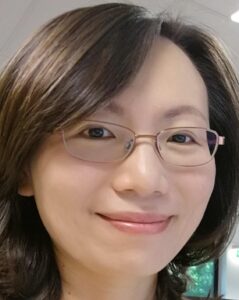 The 2023 APCDA conference took me to Kazakhstan. I left behind the usual chaos that filled my day and embarked on a long journey via Almaty to land in the company of fellow career advocates and the warm embrace of career colleagues in Astana Kazakhstan.
The 2023 APCDA conference took me to Kazakhstan. I left behind the usual chaos that filled my day and embarked on a long journey via Almaty to land in the company of fellow career advocates and the warm embrace of career colleagues in Astana Kazakhstan.
Pre-departure, the feeling of unpreparedness was drowning me. After cramming in instant information off the internet, two documentaries, and three Youtube videos, some 20 hours’ travel later, upon arriving and breathing in the crisp air of Astana, a kind of newfound clarity hit me. ‘The universe has sent a message that could not have been clearer- Just turn up.
Turn up to a place you’ve never been. To the people you’ve never met. To the colleagues you seek to
To the people you’ve never met. To the colleagues you seek to reconnect. To a culture that will teach you something, and the treasure embodied in the whole experience.
A modicum of research will point to the treasures Kazakhstan can rightfully boast. Kazakhstan is the largest producer of Uranium, three times more than Australia, which holds second place. In a country that holds 43% of the world’s supply of Uranium that can lead to zero carbon-emission energy or weapons of mass destruction, situated right between Russia and China, one feels the quietness, openness, peace, and safeness of the place. It was here that some 6,000 years ago, horses were domesticated, and a history of one of mankind’s best friends began, across the steppes, onto the roads and intertwined with the etymology of the word ‘career’ in association with courses, vehicles, and movements at full speed.
It was here that our host Nazarbayev University and esteemed representatives from all corners of Kazakhstan welcomed the APCDA delegates in person and lent their AVTS staff and technologies to enable our virtual attendees to also turn up and take in the treasures of the hospitality of our hosts and the conference program. In their capable and caring hands, the conference proceeded with welcomes by APCDA president Momoko Asaka and Prof Shigeo Katsu, followed by keynote speeches of The Hon. Mr. Sayasat Nurbek (Minister of Higher Education and Science), Professor Loretta O’Donnell (Vice-Provost for Academic Affairs at Nazarbayev University), Professor Tristram Hooley (Inland Norway University of Applied Sciences and University of Derby), Ms. Marie Zimenoff (CEO of Career Thought Leaders), and panel presentations and discussions from brave minds demystifying AI and the future of work (Dr. Marilyn Maze, Dr. Rich Feller, Dr. Jaana Kettunin, Mr. Jeremiah Wong, Mr. Rahual Nair, Dr. Shujiro Mizuno and myself).
I amassed nuggets of wisdom and insights unearthed through the process of open-mining of ideas, making connections and exploring the potential for collaborations. A tour of the city took us to a treasure hunt of magnificent landmarks including the Baiterek monument, Palace of Peace and Accord, and the international finance centre. I visited a mosque for the very first time. The Grand Mosque’s beauty quieted me. The last place of the tours- AlZhir Museum- gifted us lessons from the past to cherish the dignity of mankind (womenkind to be precise). During the tours, I learned that Mr Samuel Wee had led his team from Temasek Polytechnic in Singapore and landed before the conference for study tours, made possible with the assistance of Gaini Yessembekova, Liliya Tleukenova and partners. Their foresight and organisation to harvest experiences and knowledge put me to shame.
Still, I reaped the benefit of the spirit of exchange, which continued, after making it back to Melbourne via a 32-hour journey, throughout the virtual part of the conference. It was then even clearer, that career practitioners and researchers are our treasures. Our brainstorms and conversations are treasures. We will always have something to look back on- our dreams, hopes, and fears as discussed in Kazakstan and throughout the conference.
With this thought, I thank our conference crew, the career colleagues/hosts/supporters in Kazakhstan, and the global career villagers wherever you are, for turning up to the APCDA conference in Kazakhstan in person and virtually. I conclude my conference experience with the thought of keeping turning up.
Turn up to Trivandrum, our destination for the
There we will revisit our predictions and debates and know that it is the treasures we share with each other that will help us through the uncertainty and chaos of our times in working with our clients, students, and stakeholders.
The Asia-Pacific Career Development Association Conference 2023: New Look at Careers in a Rapidly Changing World
By Samuel Wee, Director, Student Support & Career Services, Temasek Polytechnic, Singapore
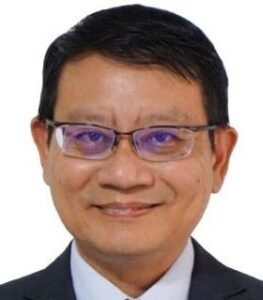 Finally! It’s back to a face-to-face Conference after a hiatus of 3 years of pandemic.
Finally! It’s back to a face-to-face Conference after a hiatus of 3 years of pandemic.
Attending the Asia-Pacific Career Development Association (APCDA) Conference 2023 in Astana was an enriching and transformative experience. Held in the vibrant capital of Kazakhstan, the conference was a confluence of ideas for professionals and scholars in the field of career development. Knowledge, insights and best practices were readily shared and discussed through the keynote presentations, panel discussions and breakout sessions.
The conference was a conducive environment to network and collaborate, all thanks to the generosity of Mr. Shigeo Katsu, President of Nazarbayev University; Dr. Loretta O’Donnell, Vice-Provost for Academic Affairs, Ms. Kadisha Dairova, Vice President of Student Affairs, Ms. Gaini Yessembekova, Director of NU’s Career and Advising Centre and her wonderful team of colleagues and the student volunteers of NU for making things happen.
Connecting with professionals from around the world provided a broader perspective and cross-cultural exchanges. This helped to deepen my understanding of regional contexts on what influences career choices and employment trends. It was exciting to hear from Kazakhstan’s Minister of Higher Education and Science, Mr. Sayasat Nurbek, on his views on education and labor market analysis and policies for Kazakhstan, and career development experts Dr. Tristram Hooley of University of Derby, UK, on predicting the future in turbulent times and career development for social justice; Ms. Marie Zimenoff, CEO of Career Thought Leaders, US, sharing her views of what working in 2035 may look like.
To make the conference complete, delegates visited places of interest and history in Astana. Places such as the Alzhir Gulag Museum, the Palace of Peace and Reconciliation, the Grand Mosque, the Bayterek Tower, the International Financial Centre next to the Congress-Centre EXPO, just to name a few. And we were treated to a delightful cultural night, where we savored the exotic Kazakhstani cuisine, costumes, music and dance. We culminated in a visit to KIMEP University in Almaty and made a stopover at Medeu, a high-altitude sports complex, the foothills of Zailiysky Alatau, the Ascension Cathedral, Zeleny Bazar and the Panfilov Park, honoring the fallen of the 1917-20 Civil War and 1941-45 World War II.
The APCDA Conference 2023 in Astana was an unforgettable experience! And I wish to thank Dr. Marilyn Maze, Executive Director, APCDA for her far-sighted vision and to Ms. Momoko Asaka, President, APCDA and Dr. Serene Lin-Stephens, President-elect, APCDA, for leading the association. I am deeply enriched with a new network of career development professionals and friends I met in Astana.
